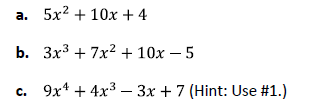Reducible and Irreducible Polynomials
Chapter 4: Reducible and Irreducible Polynomials
This worksheet reviews the facts about reducible and irreducible polynomials
from Chapter 4.
Brute Force
Sometimes we can show a polynomial is irreducible simply by showing that
none of the polynomials that could possibly be factors are factors.
1. Show that  is
irreducible in
is
irreducible in  Use an argument by
contradiction. If
Use an argument by
contradiction. If  is reducible, it has a
factor of degree 1 or a factor of degree 2. Use long division or other arguments
to show that none of these is actually a factor.
is reducible, it has a
factor of degree 1 or a factor of degree 2. Use long division or other arguments
to show that none of these is actually a factor.
Checking All the Possible Roots
• If a polynomial with degree 2 or higher is irreducible in F(x), then it
has no roots in F.
• If a polynomial with degree 2 or 3 has no roots in F, then it is irreducible
in F(x).
Use these facts to answer the following questions.
2. Show that  is
irreducible in
is
irreducible in  by showing that it has no
roots.
by showing that it has no
roots.
3. Consider the polynomial
 in
in  .
.
a. Show that this polynomial has no roots in  .
.
b. Can you conclude that the polynomial is irreducible?
Using Roots to Factor
Once we know a polynomial has a root x = a, we can factor x - a out of the
polynomial using long division. Then we can try to factor the quotient.
4. Given that x = 3is a root of the polynomial
 in
in  factor
the polynomial completely.
factor
the polynomial completely.
5. Consider the polynomial
 in
in 
a. Use the Rational Root Theorem to make a list of all the possible rational
roots of this polynomial.
b. Check each of the potential roots, and use your results to factor the
polynomial completely.
6. Repeat problem 5, but with the polynomial
 .
.
Eisenstein’s Criterion
Eisenstein’s Criterion (Theorem 4.23 on page 111) is another method can be used
to determine if a polynomial is irreducible. Note that if we can’t find a prime
to make Eisenstein’s Criterion work, that does not tell us for certain that the
polynomial is not irreducible.
7. Use Eisenstein’s Criterion to show that each of the
following polynomials is irreducible in  Make sure to indicate which prime you are using.
Make sure to indicate which prime you are using.

Reducing Mod p
The final method we have learned is reducing our polynomials mod a prime p. If
we reduce the polynomial mod p and the result is reducible, then this doesn’t
tell us anything.
8. Show that the following polynomials are irreducible in
 by finding a prime such that the polynomial
is irreducible in
by finding a prime such that the polynomial
is irreducible in  .
.

Selected Solutions
3b. No, the polynomial is reducible.

8c. In  which we showed is
irreducible.
which we showed is
irreducible.


